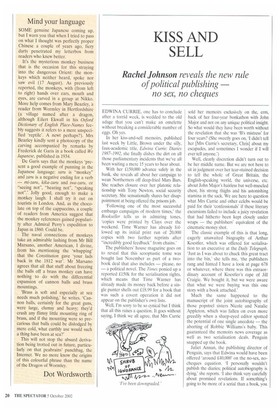Mind your language
SOME genuine Japanese coming up, but I warn you that when I tried to pass on what I thought was perfectly proper Chinese a couple of years ago, fiery darts penetrated my letterbox from readers who knew better.
It's the mysterious monkey business that is the occasion for this straying into the dangerous Orient: the monkeys which neither heard, spoke nor saw evil (17 August). As previously reported, the monkeys, with (from left to right) hands over ears, mouth and eyes, are carved in a group at Nikko. More help comes from Mary Beazley, a reader from Wormley in Hertfordshire (a village named after a dragon, although Eilert Ekwall in his Oxford Dictionary of English Place-Names feebly suggests it refers to a mere unspecified 'reptile'. A newt perhaps?). Mrs Beazley kindly sent a photocopy of the carving accompanied by remarks by Frederick de Garis in a book called We Japanese, published in 1934.
De Garis says that the monkeys 'present a good example of punning in the Japanese language: saru is "monkey" and zaru is a negative ending for a verb — mi-zaru, kika-zaru and iwa-zaru, or "seeing not", "hearing not", "speaking not".' Jolly good, enough to make a monkey laugh. I shall try it out on tourists in London. And, as the chocolate on top of the cappuccino, a couple of readers from America suggest that the monkey references gained popularity after Admiral Perry's expedition to Japan in 1860. Could be.
The naval connections of monkeys take an admirable lashing from Mr Bill Marsano, another American, I divine, from his mentioning the 'whupping' that the Constitution gave `your lads back in the 1812 war'. Mr Marsano agrees that all that stuff about freezing the balls off a brass monkey can have nothing to do with the differential expansion of cannon balls and brass mountings.
'Brass is soft and especially at sea needs much polishing,' he writes. 'Cannon balls, certainly for the great guns, were large, clumsy and heavy; they'd crush any flimsy little mounting ring of brass, and if the mounting were so precarious that balls could be dislodged by mere cold, what earthly use would such a thing have been at sea?'
This will not stop the absurd derivation being trotted out in future, particularly on that peabrains' punchbag, the Internet. We no more know the origins of this colourful phrase than the name of the Dragon of Wormley.
Dot Wordsworth




































































 Previous page
Previous page